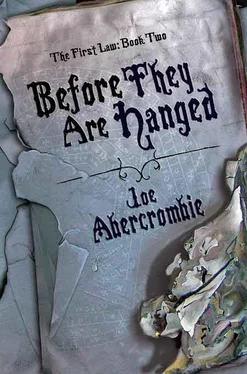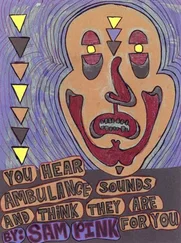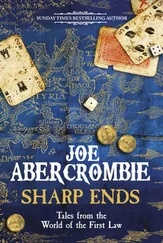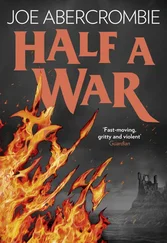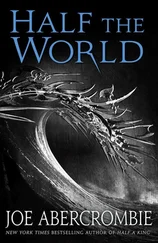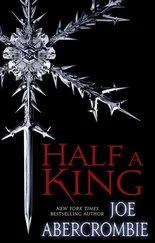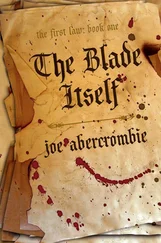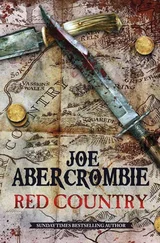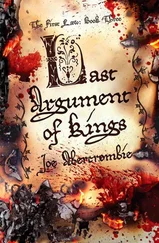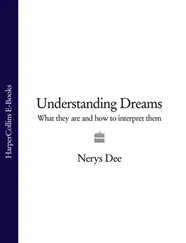Jezal had never fought two men at once before. He had never fought to the death before either, but he tried not to think about that. This was simply a fencing match. Nothing new. He swallowed, and drew his steels. The metal rang reassuringly as it slid out, the familiar weight in his palms was a small comfort. The two men stared at him and Jezal stared back, trying to remember what Ninefingers had told him.
Try to look weak. That, at least, did not present much difficulty. He did not doubt that he appeared suitably scared. It was the most he could do not to turn and run. He backed slowly away towards the cart, licking his lips with a nervousness that was anything but feigned.
Never take an enemy lightly. He looked them over, these two. Strong-looking men, well equipped. They both wore armour of rigid leather, carried square shields. One had a short sword, the other an axe with a heavy blade. Deadly-looking weapons, well worn. Taking them lightly was hardly his problem. They spread out, moving round to either side of him, and he watched them.
The time comes to act, you strike with no backward glances. The one on Jezal’s left came at him. He saw the man snarl, saw him rear up, saw the great unwieldy backswing. It was an absurdly simple matter for him to step out of the way and let it thud into the turf beside him. On an instinct he thrust with his short steel and buried it in the man’s side up to the hilt, between his breastplate and his backplate, just under his bottom rib. Even as Jezal was ripping the blade back he was ducking under the other’s axe and whipping his long steel across at neck height. He danced past them and spun around, steels held ready, waiting for the referee’s call.
The one he had stabbed staggered a step or two, wheezing and grabbing at his side. The other stood there, swaying, his piggy eyes bulging, his hand clutched to his neck. Blood began to pour out between his fingers from his slit throat. They fell almost at the same time, face down, right next to each other.
Jezal frowned at the blood on his long steel. He frowned at the two corpses he had made. Almost without thinking he had killed two men. He should have felt guilty, but he felt numb. No. He felt proud. He felt exhilarated! He looked up at Quai, watching him calmly from the back of the cart.
“I did it,” he muttered, and the apprentice nodded slowly. “I did it!” he shouted, waving his bloody short steel in the air.
Quai frowned, and then his eyes went wide. “Behind you!” he shouted, half jumping up out of his seat. Jezal turned, bringing up his steels, saw something moving out of the very corner of his eye.
There was a mighty crunching and his head exploded with brilliant light.
Then all was darkness.
The Northmen stood on the hill, a thin row of dark figures with the white sky behind them. It was still early, and the sun was nothing more than a bright smear among thick clouds. Patches of half-melted snow were scattered cold and dirty in the hollows of the valley sides, a thin layer of mist was still clinging to the valley floor.
West watched that row of black shapes, and frowned. He did not like the flavour of this. Too many for a scouting, or a foraging party, far too few to mount any challenge, and yet they stayed there on the high ground, watching calmly as Ladisla’s army continued its interminable, clumsy deployment in the valley beneath them.
The Prince’s staff, and a small detachment of his guards, had made their headquarters on a grassy knoll opposite the Northmen’s hill. It had seemed a fine, dry spot when the scouts found it early that morning, well below the enemy perhaps, but still high enough to get a good view of the valley. Since then the passage of thousands of sliding boots, squashing hooves, and churning cartwheels, had ground the wet earth to sticky black muck. West’s own boots and those of the other men around were caked with it, their uniforms spattered with it. Even Prince Ladisla’s pristine whites had acquired a few smears.
A couple of hundred strides ahead, on lower ground, was the centre of the Union battle line. Four battalions of the King’s Own infantry formed the backbone, each one a neat block of bright red cloth and dull steel, looking at this distance as though they had been positioned with a giant ruler. In front of them were a few thin ranks of flatbowmen in their leather jerkins and steel caps; behind were the cavalry, dismounted for the time being, the riders looking strangely ungainly in full armour. Spread out to either side were the haphazard shapes of the levy battalions, with their assortment of mismatched equipment, their officers bellowing and waving their arms, trying to get the gaps to close up, the skewed ranks to straighten, like sheepdogs barking at a flock of wayward sheep.
Ten thousand men, perhaps, all told. Every one of them, West knew, was looking up at that thin screen of Northmen, no doubt with the same nervous mixture of fear and excitement, curiosity and anger that he was feeling at his first sight of the enemy.
They hardly seemed too fearsome through his eye-glass. Shaggy-headed men, dressed in ragged hides and furs, gripping primitive looking weapons. Just what the least imaginative members of the Prince’s staff might have been expecting. They scarcely looked like any part of the army that Threetrees had described, and West did not like that. There was no way of knowing what was on the far side of that hill, no reason for those men to be there but to distract them, or draw them on. Not everyone shared his doubts, however.
“They mock us!” snapped Smund, squinting up through his own eye-glass. “We should give them a taste of Union lances! A swift charge and our horsemen will sweep that rabble aside and carry that hill!” He spoke almost as if the carrying of that hill, irrelevant except for the fact that the Northmen were standing on it, would bring the campaign to a swift and glorious conclusion.
West could do nothing but grit his teeth and shake his head, as he had done a hundred times already today. “They have the high ground,” he explained, taking care to speak slowly and patiently. “Poor terrain for a charge, and they may have support. Bethod’s main body, for all we know, just over the rise.”
“They look like nothing more than scouts,” muttered Ladisla.
“Looks can lie, your Highness, and that hill is worthless. Time is with us. Marshal Burr will be marching to our aid, while Bethod can expect no help. We have no reason to seek a battle now.”
Smund snorted. “No reason except that this is a war, and the enemy stand before us on Union soil! You are always carping on the poor state of the men’s morale, Colonel!” He jabbed his finger up at the hill. “What could be more damaging to their spirits than to sit idle in the face of the enemy?”
“A sharp and purposeless defeat?” growled West.
It was an unfortunate chance that one of the Northmen chose that moment to loose an arrow down into the valley. A tiny black sliver sailed up into the sky. It came only from a shortbow. Even with the advantage of height the shaft plopped down harmlessly into open ground a hundred strides or more from the front lines. A singularly pointless gesture, but its effect on Prince Ladisla was immediate.
He abandoned his folding field chair and leaped to his feet. “Damn them!” he cursed, “they are mocking us! Issue orders!” He strode up and down, shaking his fist. “Have the cavalry form up for a charge immediately!”
“Your Highness, I urge you to reconsider—”
“Damn it, West!” The heir to the throne hurled his hat down on the muddy ground. “You oppose me at every turn! Would your friend Colonel Glokta have hesitated with the enemy before him?”
Читать дальше
